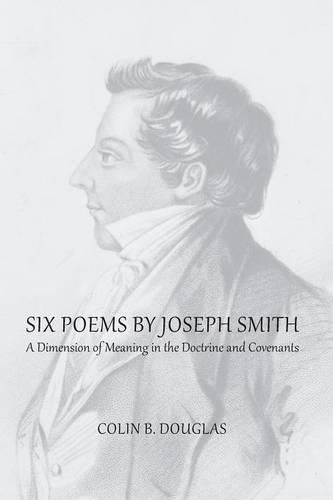Readings Newsletter
Become a Readings Member to make your shopping experience even easier.
Sign in or sign up for free!
You’re not far away from qualifying for FREE standard shipping within Australia
You’ve qualified for FREE standard shipping within Australia
The cart is loading…






This title is printed to order. This book may have been self-published. If so, we cannot guarantee the quality of the content. In the main most books will have gone through the editing process however some may not. We therefore suggest that you be aware of this before ordering this book. If in doubt check either the author or publisher’s details as we are unable to accept any returns unless they are faulty. Please contact us if you have any questions.
Like the prophet Isaiah, Joseph Smith was a poet, and in Six Poems by Joseph Smith, author and poet Colin B. Douglas has selected and formatted six sections of the Doctrine and Covenants as poetry, for, in fact, these particular sections (93, 76, 88, 1, 133, and 121-22) are poetry. As he explains, These selections from the Doctrine and Covenants are impressive poems, and to be fully understood they must be read as such. That is, they mean presentationally as well as discursively, by ‘how they say’ as well as by ‘what they say.’ Though their didactic purposes cannot be ignored, I do not propose a mere ‘appreciation’ of them as ‘literature’ in addition to those extraliterary values. The so-called ‘literary’ aspects of these works are essential aspects of the thought; they are among the means by which the works ‘mean’; and to ignore them is to ignore a dimension of meaning, for Joseph Smith was a poet-prophet–a poet whose ‘matter’ was his revelatory experiences, and a prophet who articulated–constituted–his experiences through the process of poetic creation. In him, the functions of poet and prophet are inseparable. After each poem, Douglas goes on to provide penetrating analysis, some of the most insightful commentary ever written on the revelations of Joseph Smith, including observations on meaning, structure, voice, and presentation. In summary, he writes, The ‘poetic achievement’ of Joseph Smith (in its totality, not only in these few texts) is the main current of nineteenth-century American literature, indeed of world literature, from its beginning to its imminent end. Although readers outside the faith have some excuse for not taking Joseph Smith seriously as a poet, the Latter-day Saints have none.
$9.00 standard shipping within Australia
FREE standard shipping within Australia for orders over $100.00
Express & International shipping calculated at checkout
This title is printed to order. This book may have been self-published. If so, we cannot guarantee the quality of the content. In the main most books will have gone through the editing process however some may not. We therefore suggest that you be aware of this before ordering this book. If in doubt check either the author or publisher’s details as we are unable to accept any returns unless they are faulty. Please contact us if you have any questions.
Like the prophet Isaiah, Joseph Smith was a poet, and in Six Poems by Joseph Smith, author and poet Colin B. Douglas has selected and formatted six sections of the Doctrine and Covenants as poetry, for, in fact, these particular sections (93, 76, 88, 1, 133, and 121-22) are poetry. As he explains, These selections from the Doctrine and Covenants are impressive poems, and to be fully understood they must be read as such. That is, they mean presentationally as well as discursively, by ‘how they say’ as well as by ‘what they say.’ Though their didactic purposes cannot be ignored, I do not propose a mere ‘appreciation’ of them as ‘literature’ in addition to those extraliterary values. The so-called ‘literary’ aspects of these works are essential aspects of the thought; they are among the means by which the works ‘mean’; and to ignore them is to ignore a dimension of meaning, for Joseph Smith was a poet-prophet–a poet whose ‘matter’ was his revelatory experiences, and a prophet who articulated–constituted–his experiences through the process of poetic creation. In him, the functions of poet and prophet are inseparable. After each poem, Douglas goes on to provide penetrating analysis, some of the most insightful commentary ever written on the revelations of Joseph Smith, including observations on meaning, structure, voice, and presentation. In summary, he writes, The ‘poetic achievement’ of Joseph Smith (in its totality, not only in these few texts) is the main current of nineteenth-century American literature, indeed of world literature, from its beginning to its imminent end. Although readers outside the faith have some excuse for not taking Joseph Smith seriously as a poet, the Latter-day Saints have none.